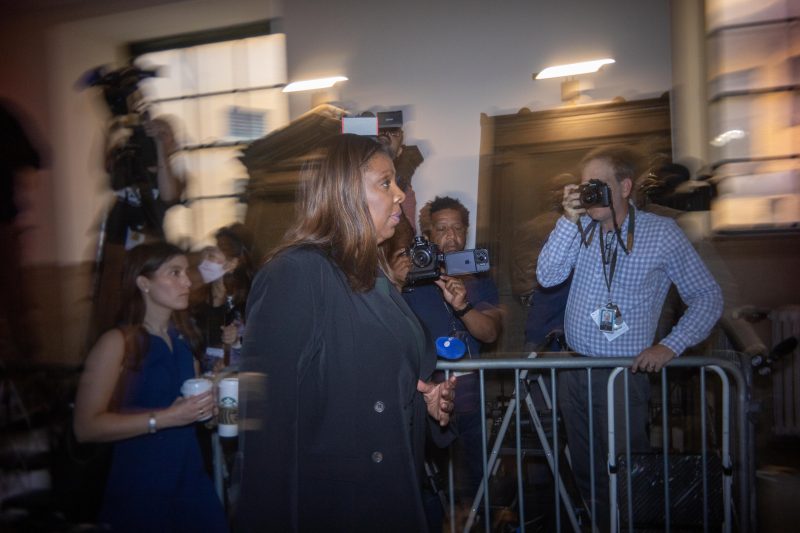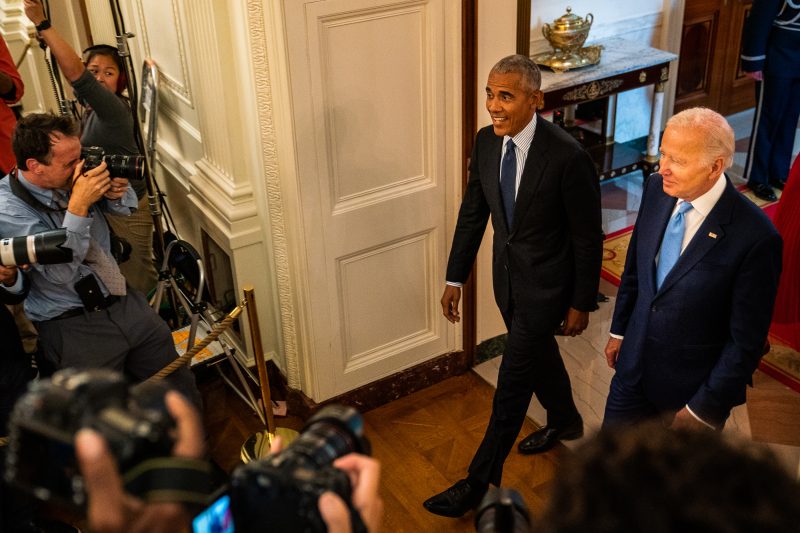Judge issues gag order in fraud case after Trump assails staffer on social media

NEW YORK — The judge overseeing a civil trial over alleged business fraud committed by Donald Trump and his company issued a gag order in the case Tuesday barring the former president from making public comments about his court staff.
The decision by Judge Arthur Engoron, announced about a day and a half into the trial, came soon after Trump posted on social media about a staffer for the judge and included a picture of the person.
Trump had already spent a significant amount of his time outside the courtroom lambasting officials in the case, repeatedly pillorying Engoron and New York Attorney General Letitia James (D), who brought the lawsuit.
Engoron’s decision amounted to a sharp rebuke of at least some of Trump’s commentary. The gag order applies to all parties involved in the case, though it appeared aimed primarily at Trump.
Speaking in court Tuesday afternoon, Engoron said he had issued a warning about such posts a day earlier. He addressed Trump’s behavior by saying “one of the defendants” had shared a “personally identifying post” about one of his staff members.
Engoron publicly announced his decision following multiple closed-door sessions with Trump and his lawyers as well as James and attorneys with her office. The judge said he had ordered the post deleted, and it appeared to be removed from Trump’s Truth Social site by Tuesday afternoon. Engoron also warned that violating the gag order would lead to “serious sanctions.”
During the midday closed-door meetings involving the judge, Trump’s campaign sent out an email focused on Engoron that sought to portray him as biased, calling him a “far-left Democrat judge.”
Trump’s public response to the fraud lawsuit has continued his long-standing practice of responding to investigations and scrutiny by denigrating officials involved and castigating them by name, often in caustic, inflammatory and bitterly personal terms.
In this case, Trump has angrily called James a “crook” and Engoron “a disgrace” who should be disbarred. Trump is facing four separate criminal cases, and he has called Jack Smith, the special counsel overseeing two of them, a “psycho” who “looks like a crackhead.”
This behavior is not new. During his first presidential campaign, Trump attacked by name a judge overseeing two lawsuits against him and then regularly criticized law enforcement officials while in office.
Trump’s reaction to the New York case has echoed the way he responded to the four indictments brought against him, as he has denied any wrongdoing in the cases and dismissed all allegations as politically driven. He has also consistently singled out individuals for criticism while relying on increasingly menacing rhetoric in his public commentary.
Trump’s tendency to comment on these cases in this manner has triggered a request for a gag order in one of them.
U.S. District Judge Tanya S. Chutkan, who is overseeing a federal case accusing Trump of wrongdoing in connection with his efforts to overturn the 2020 election, is weighing a request for a gag order brought by attorneys for Smith. Attorneys for Trump have previously told Chutkan that he is a presidential candidate who has a right to respond to criticism and his rivals on the campaign trail.
In the New York case, the gag order came on what was otherwise a fairly routine day of legal testimony from an accountant, with Trump looking on in person for a second day in a row.
James has alleged in a $250 million lawsuit that Trump and executives with his company brashly misstated facts about his properties to get better financial benefits. Trump’s side, in turn, said there was no one way to evaluate the worth of assets, insisting that there was no wrongdoing.
Engoron last week issued a pretrial decision ordering that Trump be stripped of his business licenses, which could wrest from his control dozens of properties, among them Trump Tower. The trial will determine how severe the ultimate penalties might be, with James asking that Trump and his company pay $250 million.
The trial could last for weeks or months, and Trump may testify during the proceedings.
While he was not required to attend the trial’s opening days, Trump opted to appear in court and, on Monday, used the occasion to speak extensively to reporters before the hearing, afterward and during a break. He issued a fusillade of familiar grievances against the case as well as James, Engoron and other officials investigating him. Trump, who is seeking the Republican nomination for president, also complained that the case was keeping him off the campaign trail.
He returned to the courthouse Tuesday and repeated some of the same points he had made the day before, criticizing James and insisting that his properties were worth more than she had said.
But while Trump repeatedly inveighed against the New York case outside the courtroom, the proceedings inside largely focused more on matters at issue in the lawsuit: the nuts and bolts of real estate valuations and how financial statements are created.
On Monday afternoon and across much of Tuesday, the proceedings largely centered on testimony from Donald Bender, a longtime accountant for Trump’s company and its executives.
James’s office has said it intends to prove that Trump, his adult sons, his company, some executives and related organizations sought to issue false financial statements and commit fraud.
Trump’s attorneys have pushed back on those arguments, with Christopher Kise saying on Monday: “There was no illegality. There was no fraud. There are no victims.”
When Monday’s hearing wound down, Engoron appeared to suggest that he was open to excluding evidence related to older transactions, which Trump’s attorneys had argued should be dismissed from the case based on a recent appellate court ruling dealing with statutes of limitations.
Trump took Engoron’s comments as a victory, saying to reporters immediately after that much of the attorney general’s case might be dismissed, which one of his attorneys echoed. James’s office later challenged that interpretation.
On Tuesday morning, before testimony resumed, Engoron began the proceedings by saying he wanted to “clear up any misconceptions that might have arisen” over his remarks — and added that he would not be dismissing claims in the case, as Trump had suggested could happen.
Soon after, Bender resumed his testimony, discussing things such as the agreements between his accounting firm and Trump’s business. While questioned by James’s office, Bender confirmed that the agreements would put the burden of providing accurate asset valuations on the company, not the accounting firm.
When an attorney for Trump questioned Bender, though, they were critical of his accounting work and suggested that any misreported numbers were his fault. The attorney, Jesus Suarez, questioned Bender about the drastic misrepresentation of a Trump Tower apartment that had been reported as about triple its actual size, inflating its worth.
“You’re preparing statements of financial condition for the leader of the free world and you missed it? … You never picked up the phone and said, ‘I’m sorry?’” Suarez asked. Bender said the alternating values for the Manhattan home were an oversight.
After Bender’s testimony concluded for the day, the parties held another private meeting with the judge. A courts spokesman said the private meetings at the lunch break and after court concluded for the day amount to non-public conferences that typically happen in a judge’s chambers in civil matters. It was not clear why the issues were not discussed in open court.
Leaving court Tuesday when the proceedings concluded, Trump did not address the gag order and told reporters he planned to be back the following day.
Berman reported from Washington.




